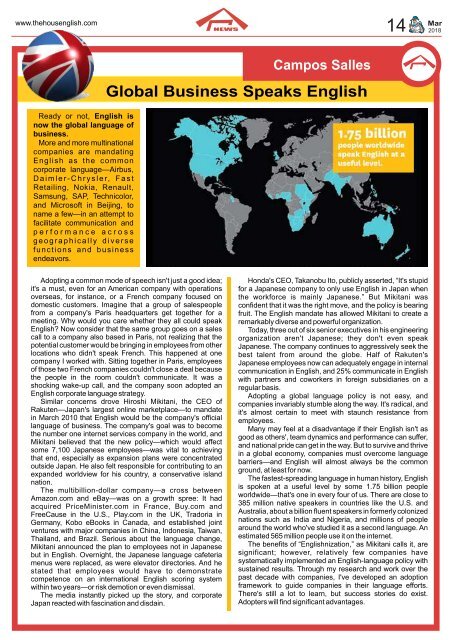TheHouseNews69
The House News March 2018
The House News March 2018
You also want an ePaper? Increase the reach of your titles
YUMPU automatically turns print PDFs into web optimized ePapers that Google loves.
www.thehousenglish.com Mar<br />
14 2018<br />
Ready or not, English is<br />
now the global language of<br />
business.<br />
More and more multinational<br />
companies are mandating<br />
English as the common<br />
corporate language—Airbus,<br />
D a i m l e r - C h r y s l e r, F a s t<br />
Retailing, Nokia, Renault,<br />
Samsung, SAP, Technicolor,<br />
and Microsoft in Beijing, to<br />
name a few—in an attempt to<br />
facilitate communication and<br />
p e r f o r m a n c e a c r o s s<br />
g e o g r a p h i c a l l y d i v e r s e<br />
f u n c t i o n s a n d b u s i n e s s<br />
endeavors.<br />
Campos Salles<br />
Global Business Speaks English<br />
Adopting a common mode of speech isn't just a good idea;<br />
it's a must, even for an American company with operations<br />
overseas, for instance, or a French company focused on<br />
domestic customers. Imagine that a group of salespeople<br />
from a company's Paris headquarters get together for a<br />
meeting. Why would you care whether they all could speak<br />
English? Now consider that the same group goes on a sales<br />
call to a company also based in Paris, not realizing that the<br />
potential customer would be bringing in employees from other<br />
locations who didn't speak French. This happened at one<br />
company I worked with. Sitting together in Paris, employees<br />
of those two French companies couldn't close a deal because<br />
the people in the room couldn't communicate. It was a<br />
shocking wake-up call, and the company soon adopted an<br />
English corporate language strategy.<br />
Similar concerns drove Hiroshi Mikitani, the CEO of<br />
Rakuten—Japan's largest online marketplace—to mandate<br />
in March 2010 that English would be the company's official<br />
language of business. The company's goal was to become<br />
the number one internet services company in the world, and<br />
Mikitani believed that the new policy—which would affect<br />
some 7,100 Japanese employees—was vital to achieving<br />
that end, especially as expansion plans were concentrated<br />
outside Japan. He also felt responsible for contributing to an<br />
expanded worldview for his country, a conservative island<br />
nation.<br />
The multibillion-dollar company—a cross between<br />
Amazon.com and eBay—was on a growth spree: It had<br />
acquired PriceMinister.com in France, Buy.com and<br />
FreeCause in the U.S., Play.com in the UK, Tradoria in<br />
Germany, Kobo eBooks in Canada, and established joint<br />
ventures with major companies in China, Indonesia, Taiwan,<br />
Thailand, and Brazil. Serious about the language change,<br />
Mikitani announced the plan to employees not in Japanese<br />
but in English. Overnight, the Japanese language cafeteria<br />
menus were replaced, as were elevator directories. And he<br />
stated that employees would have to demonstrate<br />
competence on an international English scoring system<br />
within two years—or risk demotion or even dismissal.<br />
The media instantly picked up the story, and corporate<br />
Japan reacted with fascination and disdain.<br />
Honda's CEO, Takanobu Ito, publicly asserted, “It's stupid<br />
for a Japanese company to only use English in Japan when<br />
the workforce is mainly Japanese.” But Mikitani was<br />
confident that it was the right move, and the policy is bearing<br />
fruit. The English mandate has allowed Mikitani to create a<br />
remarkably diverse and powerful organization.<br />
Today, three out of six senior executives in his engineering<br />
organization aren't Japanese; they don't even speak<br />
Japanese. The company continues to aggressively seek the<br />
best talent from around the globe. Half of Rakuten's<br />
Japanese employees now can adequately engage in internal<br />
communication in English, and 25% communicate in English<br />
with partners and coworkers in foreign subsidiaries on a<br />
regular basis.<br />
Adopting a global language policy is not easy, and<br />
companies invariably stumble along the way. It's radical, and<br />
it's almost certain to meet with staunch resistance from<br />
employees.<br />
Many may feel at a disadvantage if their English isn't as<br />
good as others', team dynamics and performance can suffer,<br />
and national pride can get in the way. But to survive and thrive<br />
in a global economy, companies must overcome language<br />
barriers—and English will almost always be the common<br />
ground, at least for now.<br />
The fastest-spreading language in human history, English<br />
is spoken at a useful level by some 1.75 billion people<br />
worldwide—that's one in every four of us. There are close to<br />
385 million native speakers in countries like the U.S. and<br />
Australia, about a billion fluent speakers in formerly colonized<br />
nations such as India and Nigeria, and millions of people<br />
around the world who've studied it as a second language. An<br />
estimated 565 million people use it on the internet.<br />
The benefits of “Englishnization,” as Mikitani calls it, are<br />
significant; however, relatively few companies have<br />
systematically implemented an English-language policy with<br />
sustained results. Through my research and work over the<br />
past decade with companies, I've developed an adoption<br />
framework to guide companies in their language efforts.<br />
There's still a lot to learn, but success stories do exist.<br />
Adopters will find significant advantages.













